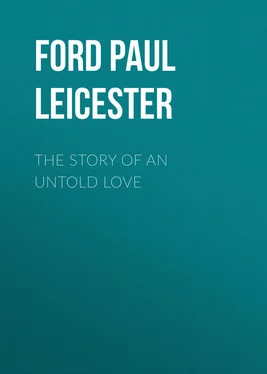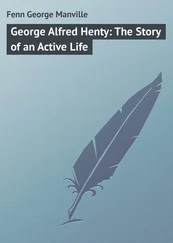Paul Ford - The Story of an Untold Love
Здесь есть возможность читать онлайн «Paul Ford - The Story of an Untold Love» — ознакомительный отрывок электронной книги совершенно бесплатно, а после прочтения отрывка купить полную версию. В некоторых случаях можно слушать аудио, скачать через торрент в формате fb2 и присутствует краткое содержание. Жанр: foreign_antique, foreign_prose, foreign_sf, на английском языке. Описание произведения, (предисловие) а так же отзывы посетителей доступны на портале библиотеки ЛибКат.
- Название:The Story of an Untold Love
- Автор:
- Жанр:
- Год:неизвестен
- ISBN:нет данных
- Рейтинг книги:5 / 5. Голосов: 1
-
Избранное:Добавить в избранное
- Отзывы:
-
Ваша оценка:
- 100
- 1
- 2
- 3
- 4
- 5
The Story of an Untold Love: краткое содержание, описание и аннотация
Предлагаем к чтению аннотацию, описание, краткое содержание или предисловие (зависит от того, что написал сам автор книги «The Story of an Untold Love»). Если вы не нашли необходимую информацию о книге — напишите в комментариях, мы постараемся отыскать её.
The Story of an Untold Love — читать онлайн ознакомительный отрывок
Ниже представлен текст книги, разбитый по страницам. Система сохранения места последней прочитанной страницы, позволяет с удобством читать онлайн бесплатно книгу «The Story of an Untold Love», без необходимости каждый раз заново искать на чём Вы остановились. Поставьте закладку, и сможете в любой момент перейти на страницу, на которой закончили чтение.
Интервал:
Закладка:
By the influence of Professor Humzel, working first through his former pupil, Baron Weiseman, secondly through Giers, and thirdly through I know not whom, we secured permission to join a Russian surveying party, and thus safely and expeditiously reached the mountains of the Altai range. We did not stay with the party after they began their work, but assuming native dress we turned southward; plunging instantly among the medley of peoples and tongues which actually realizes the mythical Babel. Turkish, Hebrew, Arabic, and Sanskrit I had mastered in varying degrees, and they were an "open sesame" to the dialects we encountered, while the hot sun and open-air life soon colored us so deeply that we passed for men of a distant but not alien race. Following nature's routes, once man's only paths, we wandered leisurely: to Tashkend on horseback, to Bokhara on foot, by boat down the Amoo to Khiva, and on to Teheran, then by caravan to Bagdad, up the Euphrates, gradually working through Asia Minor. Stopping at Smyrna for a brief rest, we took boat to Cyprus, from thence crossed to Damascus, and from Jerusalem traveled along the caravan route to Mecca. Passing over the Red Sea to Egypt, we skirted the south coast of the Mediterranean, till we reached the Pillars of Hercules.
You ought to have made that pilgrimage. In speaking of my book you expressed the wish that you might make such a trip, and those years would have been as great a playtime to you as to us. You could have borne the exposure, rough though the life was, and it would have been as compound oxygen to your brave and venturesome nature. I confess I do not like to think of that dazzlingly pure skin burned to any such blackness as I saw in my mirror on reaching the end of our journeyings; for truly no better Arab in verisimilitude strolled about the native quarter of Tangier in May, 1886, than Donald Maitland.
My long study of those older races and three years' life spent among them have not made me accept their dogma of fatalism, yet I must believe that something stronger than chance produced our meeting in that Moorish town. Down streams, over mountains, and across deserts, seas, and oceans, our paths had converged; on foot, mounted, by rail or boat, we came together as if some hidden magnet were drawing us both. A thousand chances were against our meeting, even when we were in the same town; for you were housed in the best hotel, while we lodged in a little Jewish place in the Berber quarter. In another day my father and I should have crossed to Spain, without so much as a visit to the European section. But for that meeting I should have returned to Leipzig, and passed a contented life as a Herr Doctor and Professor; for though my heart was still warm with love of you, it had been denied and starved too long to have the strength to draw me from the path my head had marked out. Yet I would not now accept the unemotional and peaceful career I had planned in lieu of my present life; for if my love is without hope, it is still love, and though you turned me away from your door with far less courtesy than you would shut out a beggar, yet I am near you and see you constantly, and that is worth more to me than peace. Good-night, my love. God bless you.
VI
February 25. It was thought of you which led to our meeting. After the evening meal of dried salt fish, pancakes, dates, and coffee, my father and I wandered out to the Sok, and, as was our wont, sat down among the people. Refusing the hasheesh water and sweetmeats which the venders urged upon us, "to make you dream of your love joyfully," we listened to the story-tellers and the singers. Some one with a fine natural voice sang presently an Arabic love-song: —
"My love, so lovely yet so cruel,
Why came you so to torture me?
Could I but know the being who
Has caused you thus to hate me!
Once I saw and gazed upon your lovely form each hour,
But now you ever shun me.
Yet still each night you come in dreams
For me to ask, Who sent you?
Your answer is, Him whom I love,
And you bid me then forget my passion.
But I reply, If it was not for love, how could the world go on?"
It was a song I had heard and loved in many lands and many dialects, but that night it stirred me deeply, and brought to mind your image, ever dear. I sat and dreamed of you till the farrago about me became unbearable; and whispering a word to my father, I rose and strode away, with a yearning truly mastering. I could have had no thought that you were near, for when we stood far closer I was still unconscious of your presence. But if not an intuition, I ask what could it be?
Wandering through the narrow streets without purpose or goal, I presently saw looming above me the great hill on which stands the Alcassaba. Climbing in the brilliant moonlight up the steep and ill-conditioned road, and passing that jumble of buildings upon which so many races and generations have left their impress, I strolled along the wall to a ruined embrasure at the corner overlooking the sea. How long I stood there leaning upon the parapet I do not know. Not till you were close upon me was I conscious that my solitude was ended.
I heard footsteps, but was too incurious to turn and glance at the intruders. Nay, more, when that harsh, strident, American voice demanded, "There, isn't that great?" I felt so irritated by both tone and words that but for the seeming rudeness I should have moved away at once. You spoke so low I could not hear your reply, and I wonder what you said, – for his "great" applied to such beauty must have rasped much more on your artistic sense than it did on mine.
"And this black fellow in the turban standing here," continued the strident voice, "he fits, too, like the paper on the wall, though probably he's a sentry taking forty winks on the sly. It makes an American mad to see how slack things are run over here."
I heard a gentle "Hush," and then a murmur as you went on speaking.
"None of these black fellows speak English," came the self-assured voice again. Then, though I could have heard his natural tone full fifty feet away, the man called much louder: "Hey! what's the name of that point out there?"
I should have chosen to make no answer; but remembering the courtesy and dignity of the race I was impersonating, I replied without turning, "Cape Spartel."
You must have said something, for a moment later he laughed, saying, "Not a bit of it. Now see me jolly him up." I heard footsteps, and then some one leaned against the parapet, close beside me. "Backsheesh," he intimated, and jingled some coins in his pocket.
I stood silent, so he tapped me on the shoulder and asked, "Are you one of the palace guards?" Unsuppressed by my monosyllabic "No," he persisted by saying, "What's your business, then?" jingling his coins again. "Stop pulling me, Mai," he added, as an aside.
"I am a stranger in Tangier," I answered quietly.
"From whereabouts?" he questioned.
"The East."
"Oh, you're one of the wise men, are you?" he observed jocosely. "Are you a Jew or a Mohammedan?"
"Not the latter, fortunately for you."
"And why fortunately?" he nagged.
"Because a true believer would have taken the question as a deadly insult."
"They'd be welcome," he laughed, "though it is rather irritating to be mistaken for a Jew. I shouldn't like it myself."
I thought of the dignified Jew traders who had made part of our caravan in the journey from Bagdad to Damascus, and answered, "There is little danger of that."
"I guess not," he assented. "But if you aren't a Jew or a Mohammedan, what are you?"
He had spoiled my mood, and since it was gone I thought I would amuse myself with the man. "A seeker of knowledge from the Altai Mountains," I responded.
"Never heard of them," he announced; "or is it your Choctaw for those?" he added, pointing towards the dark masses of the Atlas Mountains.
Читать дальшеИнтервал:
Закладка:
Похожие книги на «The Story of an Untold Love»
Представляем Вашему вниманию похожие книги на «The Story of an Untold Love» списком для выбора. Мы отобрали схожую по названию и смыслу литературу в надежде предоставить читателям больше вариантов отыскать новые, интересные, ещё непрочитанные произведения.
Обсуждение, отзывы о книге «The Story of an Untold Love» и просто собственные мнения читателей. Оставьте ваши комментарии, напишите, что Вы думаете о произведении, его смысле или главных героях. Укажите что конкретно понравилось, а что нет, и почему Вы так считаете.












